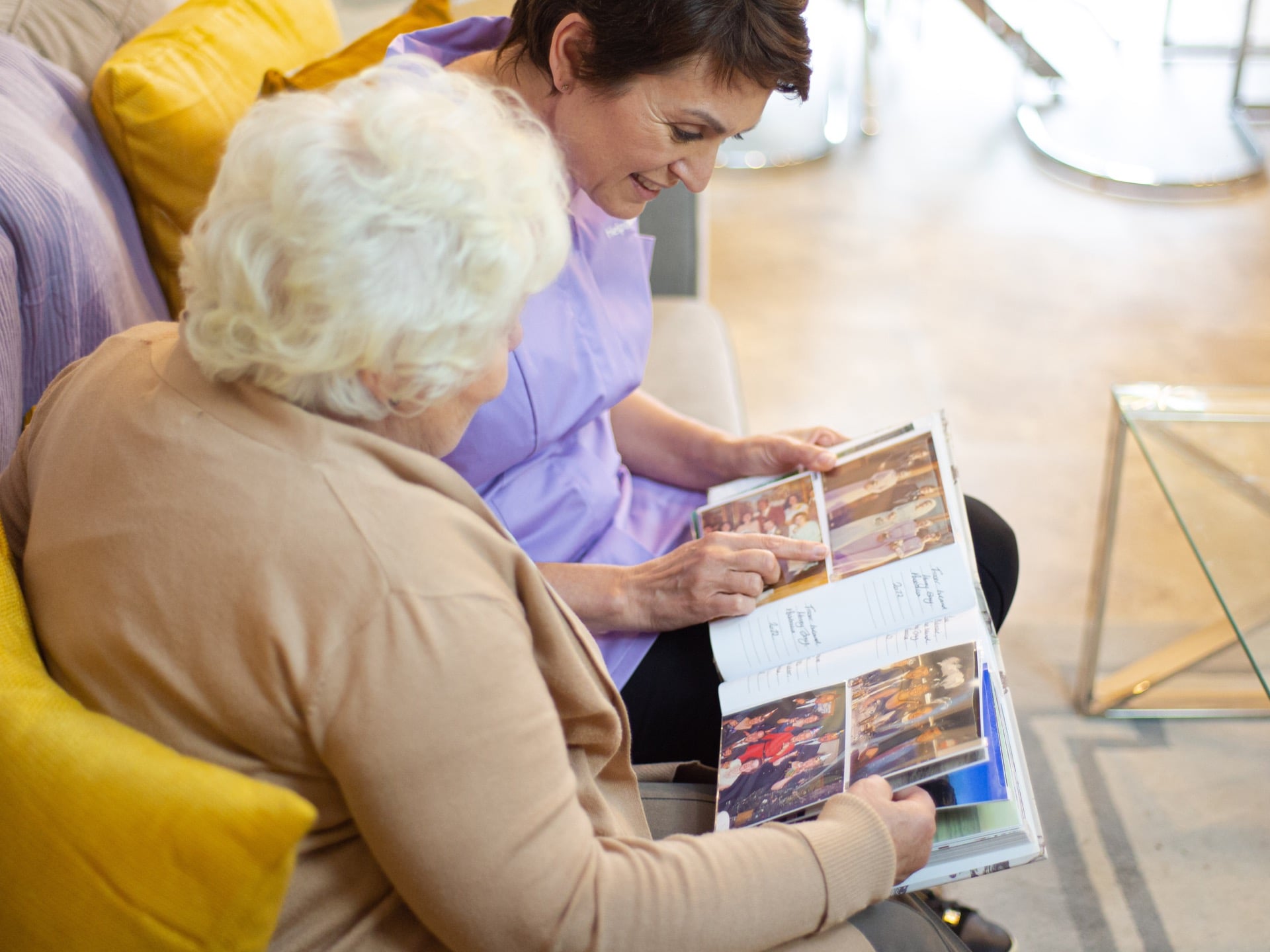Reminiscence therapy for dementia
What is reminiscence therapy?
When living with dementia, the part of the brain that manages memory storage can become damaged. The brain is unable to store memories as it once did, beginning with short-term memory and working backwards so that the memories accessible to someone may be from much earlier in their life. This can lead to disorientation, confusion, and isolation as the person feels they are in a place that is alien to them, surrounded by unfamiliar items and people. Reminiscence therapy encourages the person to try and invoke comforting memories through the use of photos, objects, sounds, smells, music, and other tools.
The Alzheimer Scotland website has some excellent resources on reminiscence therapy, which they describe as “sharing life experiences, memories and stories from the past. Where a person with dementia is more able to recall things from many years ago than recent memories; reminiscence draws on this strength.”

At Helping Hands we are experienced and compassionate carers who have been supporting people living with dementia for more than 30 years. Because of this, we understand dementia care and we always try to see the world through the eyes of the customers we’re supporting. This can make a huge difference to a person’s everyday experience with dementia and their opportunity to live well. We offer individualised visiting care and live-in care that’s fully regulated by the Care Quality Commission and Care Inspectorate Wales, so we’ll always be there when you need us.
How does reminiscence therapy help?
When someone is living with the cognitive decline that can result from Alzheimer’s and other forms of dementia, there is a danger that they may become isolated; ‘locked in’ to the past and unable to express how this makes them feel. Reminiscence therapy works on drawing out the comforting memories that the person can access and encouraging interaction – for instance looking through a photo album of the person’s wedding day together and talking about how the day made them feel.
Because the ‘emotion centre’ of the brain isn’t affected by dementia the person can draw on the pleasant and comforting memories that reminiscence therapy can bring out, leading to reduced anxiety and a better feeling of ‘belonging’.

Does asking questions help?
Asking questions of someone living with dementia has to be handled carefully so it avoids raising their anxiety and confusion levels. For instance, asking someone again and again what they had for breakfast when they don’t even remember having breakfast will only lead to them becoming distressed, so questioning needs to be approached only when the person is receptive, and the memories have been stimulated sufficiently through invoking the emotions attached to them. An example would be listening to a favourite piece of music together that the person says was playing when she met her husband. By accessing the undamaged emotion centres of the brain, the feelings attached to that night may make further detail come back to them enough to answer questions, such as ‘where did you meet?’ or ‘what colour dress did you wear that night?’ There is no guarantee, yet by helping the person to invoke the emotions they experienced on a happy occasion they can feel comforted, more relaxed, and less likely to feel anxious, for a while at least.

Other methods of stimulating the memory
Music/sound therapy
Music can help people living with dementia to express themselves, reduce frustration and anxiety, and avoid isolation. It can help them to communicate, especially when traditional methods of communication such as verbalising are no longer possible, which in itself can improve mood and cognition.
Scent therapy
Scents surround us every day and can evoke memories that reduce stress and bring comfort, as we often associate them with certain people or events without us even realising. Smelling the perfume of a much-loved person or a favourite food for instance, can evoke emotion and stimulate memory of times past.
Life story work
Working together with a loved one on creating a scrapbook or memory box isn’t only an enjoyable activity, it can evoke precious memories for you both, as well as stimulating recognition for the person living with dementia. It can also help them express their sense of identity, especially if they’ve been displaying frustration at their perceived lack of control in their life.
Validation Therapy
Devised by Naomi Feil, Validation therapy is a form of reminiscence therapy, and offers techniques that may be helpful to people living in late-stage dementia who have lost the ability to communicate. It can serve to ‘unlock’ memories and ease frustration and distress for people who feel they need to retrieve certain memories as the end of their life approaches.
Reminiscence topics for someone living with dementia
Favourite foods
Talking about favourite foods, or even better, preparing or eating them together, may be a great way to help stimulate senses affected by dementia.
Childhood holidays
Most people reminisce about happy memories, and special days during childhood is one that can make even the least sentimental people smile.
Schooldays
Whether schooldays were a happy time or not, most people can pick out an occasion when something enjoyable and exceptional happened.
Pets they loved
Even if the pet wasn’t their own, the majority of people have memories of an animal who meant something to them in their early years.
Books they enjoyed
Not everyone is a reader, but even if the habit waned in later years, a lot of people can remember learning to read and the joy they got from reading as a child.
Their first car
The pride that was gained from passing their driving test and especially getting their first car, is something that a lot of people can relate to.
How Can Helping Hands Help with Dementia Care?
Because we understand dementia so well, we are the best-placed care company to support you or your loved ones. We have 150 branches across England and Wales so despite being one of the UK’s most prolific private care companies, we’re local to you. We ensure that our visiting and live-in carers have all the skills and practical knowledge they’ll need for helping someone with dementia to live well in their own home, promoting their independence and protecting their dignity at all times.
We design a bespoke care experience for all of our customers, meaning we can truly claim to offer exceptional person-centred care, whether we’re needed for an hour a day or around-the-clock. Talk to our local care team in your area to discover how we could be supporting you or those precious to you within days.
